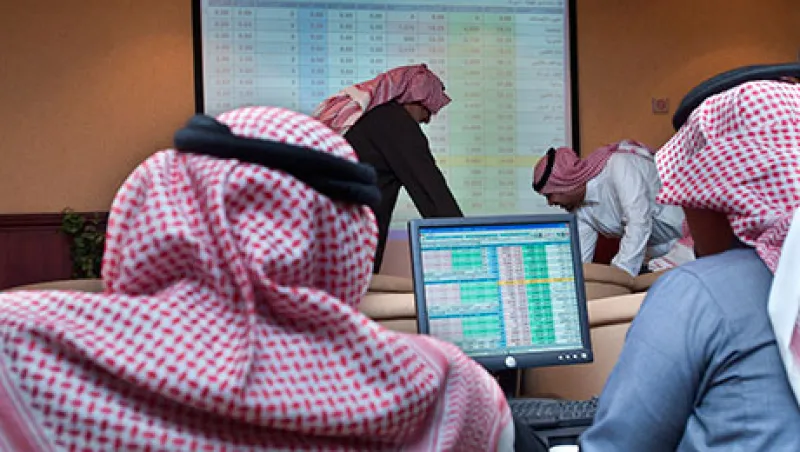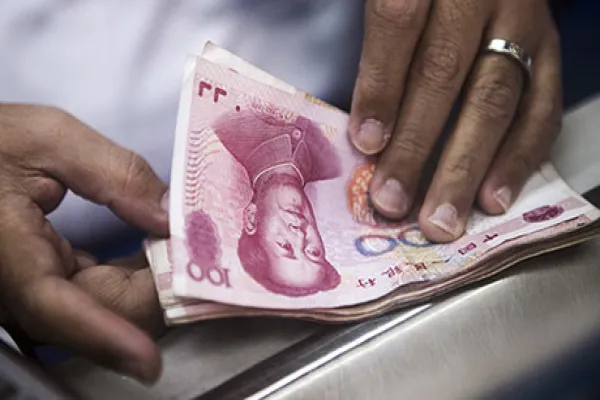The price of oil may be depressed, but investor spirits in Riyadh are anything but.
Anticipation is growing that a long-awaited opening of the Tadawul, the Saudi stock market, to foreign investors will come as early as next month. Analysts believe the move will provide fresh momentum for the $500 billion market, which has risen by nearly 30 percent since mid-December. “This will be the event of the year in emerging markets,” says John Sfakianakis, a veteran economist and investment strategist in Riyadh who opened an office there in September for the London-based emerging-markets specialist Ashmore Group.
Oil was trading at more than $100 a barrel in July when the government first announced its intention to open up the market at some point in 2015. Since then the Tadawul has been on a roller coaster ride, hitting a peak of 11,149 in early September, then plunging more than 34 percent over the next three months as oil prices collapsed before staging a recovery. The partial rebound of oil prices since January has helped. So has the government’s ability to draw on its $750 billion in reserves, which has helped keep the economy flush.
Growth has slowed but remains positive. The International Monetary Fund projects that the economy will expand by 2.8 percent this year, down from 3.6 percent in 2014. Nonoil sectors, which account for virtually the entire stock market, should expand by 5 percent, says Bassel Khatoun, Franklin Templeton’s head of equities for the Middle East and North Africa, based in Dubai.
Many of the bright spots outside of oil are in the country’s finance sector. Investors’ hopes run particularly high for top financial institutions like Al Rajhi Bank and Samba Financial Group. They have little debt themselves and a protected customer base that ensures they pay no interest on 65 percent of their deposits, Khatoun notes. “The banks in general have very clean balance sheets, cheap funding and a young, growing population to lend to,” he says.
The arcane logic of market indexes should also push substantial flows into Saudi Arabia over the next few years. The market’s size — capitalization is similar to that of South Africa or, in its currently depressed state, Russia — would all but guarantee eventual inclusion in the MSCI Emerging Markets index, up from its present designation in the Frontier Markets index. If all goes according to plan, the country will likely enter the index in 2017 with a weighting around 4 percent, says Alison Graham, chief investment officer and founder at Voltan Capital Management, a New York–based hedge fund firm that invests in frontier markets. With an estimated $1.4 trillion linked to the MSCI Emerging Markets index, that would translate to $56 billion in inflows.
Not by coincidence, perhaps, that is roughly equal to the investment level envisioned by the Saudi Capital Market Authority’s draft regulations, which would limit foreign holdings to 10 percent of the market as a whole. The opening would also be restricted to investors who manage at least $5 billion and have a five-year track record. No single investor could own more than 5 percent of a company, and the single-share ceiling for foreign investors jointly would be 20 percent. That could go up to 49 percent if they were to team with partners from within the Gulf region who already do business in Saudi Arabia.
All that fine print adds up to a small bang, rather than a big one, in Saudi for the moment. The most important restriction may be the $5 billion ante, which excludes many of the hedge funds and regional players that would normally pioneer a move into an opening market like Riyadh’s, Khatoun says. But Saudi watchers hope for more once their foot is in the door. King Salman, who assumed the Saudi throne in January after the death of his 90-year-old half brother, Abdullah, has stressed continuity of policies across the board. For its part, the CMA has reassured markets the liberalization is still planned for the first half of this year. “For the Saudis, the stock market is the only thing preventing them taking their place as a big G-20 economy,” says Ashmore’s Sfakianakis. “Based on experience in China and elsewhere, this will be the first step toward a wider opening.”
Saudi Arabia cannot maintain current spending levels forever if oil does not rebound. The population’s relatively comfortable lifestyle is heavily dependent on state largesse, and the kingdom needs an oil price of $106 a barrel to balance its budget, the IMF calculates. Investors seem willing to bet King Salman can keep the good times rolling for a few more years at least, though. When the Saudi market door opens, money will be waiting to come in.
Get more on emerging markets .






